The Jacob Cycle in Genesis
Deception for Deception
Who breaks the cycle?
022
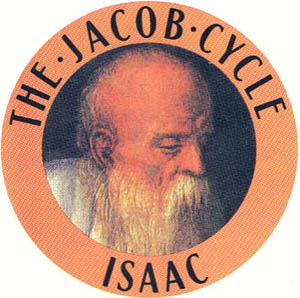
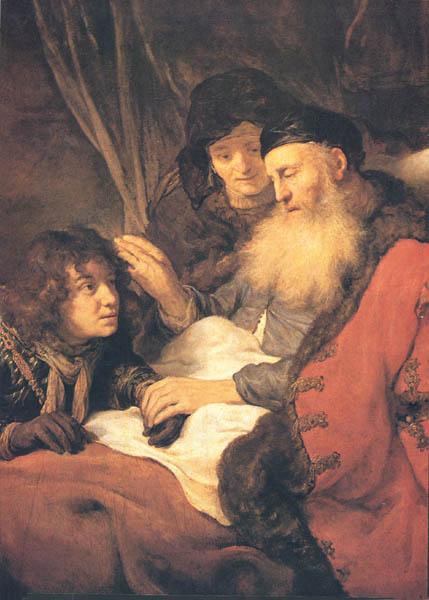
The biblical story of Jacob is artistically an exquisite creation, psychologically an intriguing portrait, and religiously an interpretive treasurehouse—but it has always been a problem. Even Sunday school children ask why the hero Jacob, the great patriarch, withholds food from his own brother Esau to get his brother’s birthright and then lies to his blind father Isaac on his deathbed to get his father to give him his brother’s blessing. Why did the ancient Israelite author tell the story this way, portraying his own ancestor as manipulative of and deceitful to his family?
Moreover, it is not Jacob alone who is portrayed as a deceiver. His mother Rebekah, his uncle Laban, his wife Rachel, and most of his sons become involved in deception as well. Why conceive of such a story? Why include it in sacred literature?
Stories of complex and infectious intrafamily conflict have long—perhaps always—been the subject of powerful literature. A comedian used to tell the story of Hamlet: At the end, Ophelia has drowned, her father Polonius has been run through with a sword, her brother Laertes and her lover Hamlet lie dead onstage from poisoned swords, Hamlet’s mother Gertrude lies dead of a poisoned drink, Hamlet’s uncle Claudius lies dead from Hamlet’s thrust of Laertes’ sword. The comedian suggested the ghost of Hamlet’s father who opened the play should then walk onto the stage and say to the audience with a sigh, “You see? Go try and raise a family.”
Hamlet is only one example of portrayed family conflict in a group that includes the families of Agamemnon and Karamazov. In our Freudian age, it hardly seems necessary to explain why this subject matter is so rich artistically and so powerful dramatically. It should hardly surprise us therefore, that such a story appears in the Bible.
The story of Jacob is the story of a family. The family is split geographically. Half lives in Canaan, half in Mesopotamia. The Bible focuses on the branch in Canaan, but because of the conflict within the family the story moves to Mesopotamia when Jacob goes there; then, after 20 years, back to Canaan; and finally culminates, in Joseph’s time, in Egypt.
From the very beginning, the story of Jacob is about conflict. Jacob and his twin brother Esau fight in their mother Rebekah’s womb. Esau is born first, but Jacob reaches out from the womb to hold him back. Because Esau’s birth priority is given as a fact, 024Jacob’s conflict with his brother requires him to find some means of circumventing that fact. The means is deception.
The story soon becomes an account of a family whose members are constantly deceiving one another. Jacob, with Rebekah’s help, deceives Esau and Isaac in order to get for himself the birthright and blessing. Jacob’s uncle Laban deceives Jacob by substituting Laban’s elder daughter for the younger daughter Rachel whom Jacob loves. Jacob, in turn, deceives Laban over ownership of their livestock. Rachel deceives her father Laban over possession of the family’s icons. Jacob’s own sons then deceive him concerning the disappearance of their brother Joseph. Joseph deceives his brothers concerning the fate that awaits them in Egypt. Jacob’s sons Simeon and Levi deceive the people of Shechem over an injury to their sister Dinah. Jacob’s son Judah deceives his own daughter-in-law Tamar by reneging on his promise to let her marry his last son. Tamar, in turn, deceives her father-in-law Judah to expose his wrongful deception. Go try and raise a family.
The theme of deception as reflected in these stories has not gone unnoticed. Literary and theological interpreters of Genesis have commented on it for centuries—and they are troubled by it. What are we to think of Jacob’s behavior—and of Rebekah’s and Rachel’s and Judah’s? Some interpreters try to vindicate Jacob, to rationalize his actions, to disparage Esau, or to come to terms in other ways with what Jacob does. But how does the biblical text itself treat this matter? How does the biblical author present the story of these acts and their consequences? The fact is that for every act of deception, an ironic recompense occurs later in the story. The consistency of this recompense indicates that the biblical author is specifically developing the theme of deception and its recompense to a denouement at the end of the story.
Jacob’s first action is to obtain his brother Esau’s birthright, which will entitle Jacob to a double portion of their father Isaac’s property after his death. The story is well known: Esau returns from hunting, famished, and asks his brother for food; Jacob insists that Esau sell him his birthright in return for some lentil stew. Esau says that the birthright will do him no good if he dies of hunger, and he capitulates and sells Jacob his birthright. Jacob then gives him bread and lentil stew (Genesis 25:29–34).
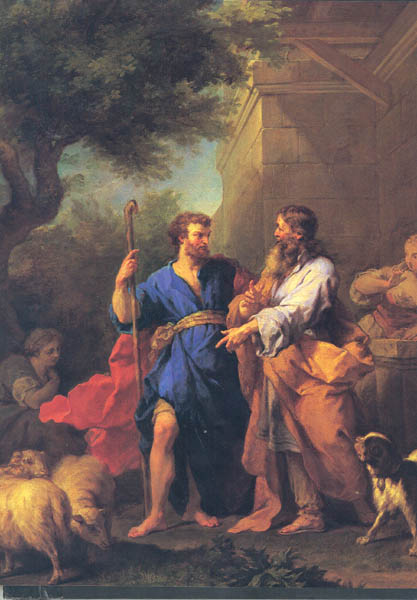
Jacob’s recompense comes years later in an equally famous story. Jacob loves his cousin Rachel, and he agrees to work for her father Laban for seven years for Rachel’s hand in marriage.
But at the end of the seven years, on the morning after the wedding night, Jacob finds that Laban has substituted Rachel’s older sister, Leah, for Rachel. Jacob asks his uncle/father-in-law, “Why have you deceived me?” Laban answers:1
“It is not done thus in our place, to give the younger before the firstborn” (Genesis 29:26).
Not “the younger before the elder,” but “the younger before the firstborn.”a The man who took away the firstborn privilege of his brother has now suffered because of the firstborn privilege of his beloved’s sister.
Is this reference to Leah as the firstborn a chance detail based on a coincidence of language, or is it an essential development in the structure of the story?
Jacob’s second action is to get the blessing that his father Isaac intends for Esau, a blessing of both prosperity and dominion. Isaac, now old and blind, not knowing when he will die, asks Esau to hunt some game and prepare a meal for him, after which he will bless him. Isaac’s wife Rebekah loves Jacob, however. She tells Jacob that she has overheard what Isaac told Esau. She sends Jacob to the flocks to bring back two choice goat kids, and from this she 026prepares a meal for Isaac like the meal Isaac has asked Esau to prepare. She then sends her preferred son Jacob to pose as Esau to his blind father and thus to receive the blessing. To deceive his father, Jacob wears Esau’s clothing that bears the smell of the hunter brother. The skins of kids cover Jacob’s arms to imitate his brother’s hairy skin. Thus attired, Jacob brings Isaac the meal Rebekah has prepared. Isaac asks who has come to him. Jacob replies, “I am Esau, your firstborn.” Isaac draws Jacob to him and feels his hairy skin: “The voice is the voice of Jacob, but the hands are the hands of Esau,” he says. Then Isaac eats the meal and draws Jacob to him once again. Isaac smells the clothes Jacob is wearing—Esau’s clothes. Jacob kisses his father, who then blesses him with the blessing meant for Esau.
When the deception becomes known, Isaac trembles, and Esau weeps in bitter anguish, “Bless me too, father.” Jacob answers: “Your brother came with deception and took away your blessing.” Esau cries out, “Isn’t his name Jacob [to catch]! He’s caught me these two times! He took away my birthright and now he has taken away my blessing” (Genesis 27:34–36).
Years later, Jacob is paid back for this, too. His own sons, jealous of Jacob’s preferred son Joseph, sell Joseph into slavery in Egypt. They dip Joseph’s coat of many colors in the blood of a goat and take it to the now elderly Jacob. “We found this,” the brothers say, bringing it to Jacob. “Recognize this!” they tell Jacob. Jacob recognized it, the text notes: “It is my son’s coat; a wild animal has eaten him” (Genesis 37:33). Jacob rends his clothes and wears sackcloth in mourning for his son. His other children seek to comfort him, but he refuses to be comforted. “Thus his father bewailed [Joseph].” And thus was Jacob deceived.
More particularly, Jacob once deceived his father with his brother’s clothing and the meat and hide of a goat. Now his sons deceive with their brother’s clothing and the blood of a goat. Worse, Jacob really deceives himself in response to his sons’ request that he “recognize” the coat. Worse still, the word that is used for “goat” in the Joseph story is
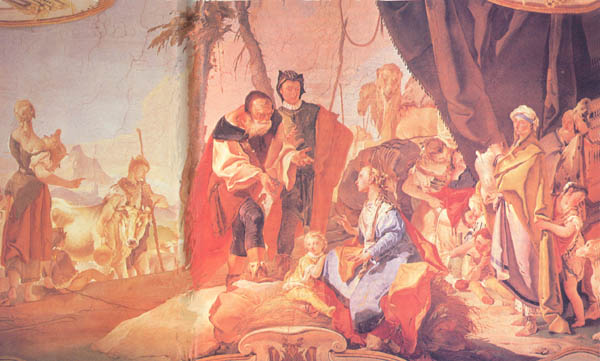
I have already told how Laban deceives Jacob by substituting Leah for Rachel. Laban, too, is repaid in the same coin. Years later, Jacob deceives Laban back. In return for his continued work for Laban Jacob asks for all the spotted, striped and brown sheep and goats among Laban’s flocks. Laban agrees. Jacob, who is in charge of the flocks, then 027connives (by magic? miracle? paragenetics?) to produce such colored sheep and goats in great numbers, until he is rich in ewes and rams (Genesis 30:28–43). Thus Jacob deceives Laban back. Laban has deceived him over Rachel and Leah; Jacob has paid Laban back by getting his ewes and rams.
In Hebrew, ewes and rams are re
Like father, like daughter: next Rachel deceives her father Laban. Perhaps this, too, is in further recompense for his having substituted Leah for her at the wedding. But Rachel, too, is paid back, as we shall see. The time comes when Jacob leaves Laban’s house. He departs secretly with his wives and children, his flocks and his belongings. Unknown to Jacob, Rachel his beloved steals her father’s household icons, the teraphim. Three days later Laban discovers that Jacob and his family have fled and that his icons are missing. Laban pursues Jacob and catches up with him. Laban charges Jacob with having stolen his teraphim. Jacob, not knowing that Rachel has stolen the icons, allows Laban to search 028the camp and tells him “With whomever you find your gods, let that person not live” (Genesis 31:32). Laban proceeds to search all the tents for his teraphim. When he comes to Rachel’s tent, she hides the stolen gods in her camel saddle and sits on it. She tells her father, “I cannot get up before you because the way of women is with me” (Genesis 31:35).
Thus Rachel deceives her father and successfully appropriates his teraphim, perhaps in recompense for his having denied her wedding night with the husband who had labored for her for seven years.
But Rachel’s deception proves to be the costliest of all. Jacob, not knowing that she has stolen the icons, has unwittingly cursed his wife: “With whomever you find your gods, let that person not live.”
Rachel has deceived her father by claiming to be menstruating. Four chapters later Rachel dies in childbirth—which involves the cessation of menstruation.
Like father, like sons: We have already seen how Jacob’s sons deceive their father over their sale of Joseph into Egyptian slavery; they take Joseph’s coat of many colors, dip it in a goat’s blood, and take it back to their father Jacob to deceive him into believing that Joseph, the first son of the beloved Rachel, has been devoured by wild beasts.
Years later, when Joseph has risen to extraordinary power in Egypt, he, in turn, deceives his brothers. Jacob sends the brothers to Egypt to buy food, for the famine in Canaan is severe; in Egypt the stores are bulging, thanks to Joseph’s wise administration, to say nothing of his ability to foresee the seven-year drought.
When the brothers arrive in Egypt, Joseph interrogates them, but they do not recognize Joseph, now the chief dispenser of rations of grain. Repeatedly they refer to themselves as “your slaves” as they speak to Joseph whom they once sold as a slave (Genesis 42:10–13; 44:9, 16, 21, 23, 31). Again, the deception for deception theme is developed subtly in the text.
The ten brothers (excluding Benjamin) had sold Joseph into slavery for twenty measures of silver. When they come to Egypt to buy grain, they are repaid with twenty measures of silver. The story is a bit complicated, but the point is clear. Joseph first accuses the brothers of being spies from Canaan. They, of course, deny it. They are, they say, ten of twelve sons of a man from the land of Canaan, one son having died (Joseph) and the other (the youngest, Benjamin) having remained home with his father. Supposedly to test whether they are telling the truth Joseph keeps Simeon and sends the other nine back to Canaan to return with Benjamin. To confuse them further, Joseph secretly has the silver that they have paid for the grain placed back in the sacks of the nine brothers. Later, they return with their youngest brother, Benjamin, to buy more food. Joseph releases Simeon and sends off all eleven brothers; but, again, he secretly has their silver placed back in their sacks, this time of eleven brothers. Thus Joseph has returned a total of twenty measures of silver—the same as the price for which the brothers sold Joseph into slavery (Genesis 37:28, 42:3–25, 43:15–44:1). The brothers thus receive twenty measures of silver a second time, but this time under very different circumstances. They learn what it means to feel helpless, to be the victims of injustice. And, as they deceived, they are deceived.
Reuben, the oldest brother, had originally opposed selling Joseph and indeed had not been present at the time of the deed. It was, therefore, Simeon, the second oldest, who was responsible—and it was he who was imprisoned to assure the return of the brothers with Benjamin. Thus Simeon, too, apparently received a hidden recompense for his role in the sale and deception.
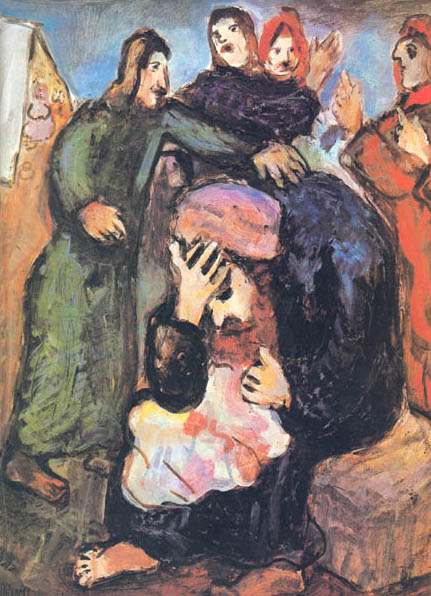
The deception—and its recompense—continues. Jacob’s son Judah deceives his daughter-in-law Tamar. Judah has three sons. Judah marries his oldest son to Tamar. But the son soon dies without children. The second son then marries Tamar to provide offspring for the deceased brother, but the second son also dies. Although Judah promises Tamar that he will give her his third son, Shelah, he is fearful that Shelah, too, may die if he marries Tamar. Judah therefore deceives Tamar by telling her that Shelah is still too young for marriage and that she should wait a while. She has a long wait. Shelah grows up, but Judah makes no wedding plans. Tamar poses as a veiled prostitute on the road. Judah, now a widower, sees her and is attracted to her. He sleeps with her, and he promises to pay her one goat. As a pledge for the payment he leaves, among other things, an article of his clothing. When Judah sends to redeem his pledge, she is nowhere to be found. Some time later, Judah learns that his daughter-in-law is pregnant. Since Tamar is still officially bound to Judah’s son Shelah, this is the equivalent of 030adultery. Judah says that Tamar should be burned for this offense, but Tamar produces Judah’s pledge items and says, “Recognize these.” He does—and acknowledges that he has wronged her. Like father, like son. The deceiver has been deceived. Judah deceived Tamar; Tamar has deceived him. And the retribution fits the original deception. He denies her a man; she makes him her man. Moreover, this deception involves clothing (the pledge) and a goat (the payment)—just as Jacob deceived his father Isaac by donning his brother’s clothing and giving him the cooked meal of a goat and just as the brothers deceived Jacob concerning Joseph—with Joseph’s coat dipped in the blood of a goat. Moreover, the story of Judah and Tamar culminates with a “Recognize,” (the pledge items Judah had given her), just as Jacob was told to “Recognize” the clothing (the coat of many colors) dipped in the blood of a goat. Thus clothing and a goat are thrice involved in deceptions.
Tamar gives birth to twins. Like Jacob and Esau, they struggle to be first out of the womb! Because they are Judah’s sons, not Shelah’s, they are replacements, as it were, for Judah’s two sons who had died after marrying Tamar (Genesis 38).
Three other sons of Jacob commit acts of costly deception. Jacob’s firstborn son Reuben deceives his father by sleeping with Jacob’s concubine Bilhah; but Jacob finds out (Genesis 35:22).
Jacob’s second- and third-born sons, Simeon and Levi, deceive the people of the city of Shechem. The prince of that city, whose name is also Shechem, has slept with their sister Dinah and only later asked for her hand in marriage. Her brothers respond to the proposal with deception, saying that they will only permit intermarriage with the Shechemites if the latter circumcise all their males. The Shechemites agree to the surgery, and when the Shechemite men are immobile from the pain of the circumcisions, Simeon and Levi come and massacre the city. Jacob criticizes them for this act, but they answer, “Shall he treat our sister like a prostitute?” (Genesis 34).
The price that Reuben, Simeon and Levi pay for their deceptions is loss of place in the succession to the birthright. On his deathbed, Jacob explicitly takes away Reuben’s pre-eminence because he has slept with Bilhah (“When you mounted your father’s bed you brought disgrace.” Genesis 49:3–4) and condemns Simeon and Levi to dispersal (“When angry they slay men.” Genesis 49:5–7). The honor goes to the fourth son, Judah (“The sceptre shall not depart from Judah.” Genesis 49:8–10).
Every deception is paid back. All of the deceivers are deceived.
What started this chain of deceptions? What brings it to an end?
It is difficult to say what started it. Perhaps, from the biblical authors’ point of view, it was a matter of destiny, a complex series of twists of events that explained how the people of Israel came to be residing in Egypt. Or perhaps we should look for the root and model of this family’s inclination for deception prior to Jacob. After all, Jacob’s father Isaac tried to deceive the Philistine king Abimelek into believing Isaac’s wife Rebekah was his sister (Genesis 26). Isaac’s father Abraham had tried the same deception on the same king and on the Egyptian king as well (Genesis 12 and 20). Does the chain of deceptions begin with Rebekah who helps her preferred son Jacob to deceive Isaac? Or does it begin with Isaac? Or with Abraham? Or perhaps with the snake in the Garden of Eden?
It is easier to identify what brings this chain of deception to an end: forgiveness. The sequence of deceptions that causes this family so much suffering finally comes to an end when Joseph chooses not to take revenge on his brothers. True, Joseph causes them discomfort, but only to the point of their recognizing their past wrong. He does them no harm corresponding to what they have done to him, despite the fact that it is clearly in his power to do so. So much of the Book of Genesis is about this family’s deceptions, but the book’s last chapter is a touching portrayal of forgiveness. After Jacob dies, the brothers say to one another, “He [Joseph] will certainly pay us back all the harm that we did him.” But they soon learn that their younger brother is no longer the simple teenager who once naively offended them by telling them his grandiose dreams. He rejects deception and retaliation.
“And Joseph said to them, ‘Do not be afraid, for am I in the place of God? You intended harm for me. God intended it for good: in order to do as it is today, to keep a large people alive. And now do not be afraid. I shall provide for you and your children.’ And he comforted them, and he spoke on their hearts” (Genesis 50:15–21).
Wherever the deception begins, it ends when one family member puts family above revenge, when one who is manifestly entitled to retribution chooses not to take it.
Joseph changes from what one could say is a thoughtless teenager to a sensitive, powerful man. No equivalent character development is to be found in Adam, Noah, Abraham, Sarah, Isaac or Rebekah. They all remain basically constant figures through the stories about them.
The one other figure who undergoes dramatic character development equal to Joseph’s is Jacob. Here the matter of deception is intimately related to his character development. As Esau points out, Jacob’s very name connotes deception: to catch. 031Jacob’s name also recalls his earliest conflict with Esau because the name Jacob is related to the Hebrew word for heel (
Is this divine encounter the signpost of the change in Jacob’s character, or the cause? Either way, as his character changes and he ceases to be the deceiver, just then he sheds the name Jacob (the one who catches) and becomes instead Israel (the one who has struggled with God) (Genesis 32:25–29).
The Bible does not “clean up” Jacob the way some Sunday schools, midrashim and modern interpreters do. The biblical writers seem to have been quite content to leave their heroes imperfect.
Why? Why should the author even conceive of such a story? Perhaps he saw deception in the world around him or, for that matter, in his own family, and wanted to say, “It comes back.” Perhaps he meant this as a message to his people? To his wife? To his children? To his in-laws?
Or perhaps he conceived it in literary protest against the ancient Near Eastern practice of glorifying national heroes. As has been frequently observed, to read the ancient reports, one would think that no Near Eastern king ever lost a battle. In this respect, it is tantalizing to compare the Jacob cycle to the Court History of David in Second Samuel. The similarity in style, concerns and actual portrayals of events between these two works is so striking that scholars have occasionally suggested that they are by the same author. Not the least among the similarities is that the Court History, too, manifestly develops the idea of deception for deception. For example, after King David sleeps with Uriah’s wife Bathsheba and she becomes pregnant, David schemes to deceive Uriah into thinking Uriah himself is the father of the child in his wife’s womb. When this fails, David plots successfully to have the devoted Uriah killed in battle. The prophet Nathan then deceives King David by concealing the underlying message of a story he tells David about a rich man with a great flock who steals from a poor friend with but one lamb in order to get food to entertain a guest. David flies into a rage at Nathan’s story and proclaims that the rich man deserves to die. “And Nathan said to David, ‘That man is you!’ ” (2 Samuel 12:1–7). Nathan thus exposes David’s crime with a deceitful story, causing David to condemn himself.
But David pays a price for his deception of Uriah. The price involves a series of deceptions among his children. Here again a Judean author was he prepared to describe the founder of the national dynasty critically.
For whatever purpose the author of the Jacob cycle conceived to this story, the fact is that he, among other biblical writers, had a realistic impulse, a sense of the true psychological complexity of families: sibling rivalry, fathers and sons in conflict, mothers finding channels of influence in male family structures, women torn between fathers and husbands. Would a story of idealized heroes have been more effective, more inspiring?
There is another value to this kind of treatment— a theological value. By not glorifying its human heroes, the text glorifies its other central figure, the deity. The message here, repeated through the generations described in the Hebrew Bible, apparently is that God can work through anyone: through a deceiver, a straying king, or a man with a “heavy mouth and heavy tongue” (Exodus 4:10). His choice of a prophet can be a layperson (Isaiah), a priest (Jeremiah 1:1) or a cowboy (Amos 7:14). The principles of divine selection are usually inscrutable. He gives Rebekah an oracle while she is still carrying the twins Jacob and Esau in her womb; the oracle tells her that her younger son will dominate the elder. Does the oracle reflect divine foreknowledge or divine control? When she takes a hand in affecting the outcome hereself, is she acting in pious 068obedience to the oracle? Or is she acting out of loyalty to her preferred son? As usual, the Bible’s literary and theological ambiguities are as interesting as its articulated facts.
The deception-for-deception sequence is not obvious in the narrative. The writer did not hit his readers over the head with it. He developed his point through a story, not by a pronouncement. And he wove it through the story, so that generations of readers would have the burden of seeking it out— and the pleasure of discovering it. And so it is that the Bible has had, concealed within it, treasures of art and ideas some intended by the authors and some not, for successive generations to uncover. Splendid Puns lie embedded in the Book of Jonah for millennia, and gradually they are identified, until the work is recognized as an elaborate fabric of word play.2 The Song of Deborah (Judges 5) is identified after millennia, as the poetic source of the prose history of Deborah in Judges 4.3 New generations come with new methods, new interests and new sensitivities. This article is an example of the literary study of the Bible being used in the present generation of biblical scholars. Literary study, enriched with historical, theological, and psychological study, is playing its part in bringing to light more of the Bible’s concealed treasures. The Bible at its richest has not yet been read.
The biblical story of Jacob is artistically an exquisite creation, psychologically an intriguing portrait, and religiously an interpretive treasurehouse—but it has always been a problem. Even Sunday school children ask why the hero Jacob, the great patriarch, withholds food from his own brother Esau to get his brother’s birthright and then lies to his blind father Isaac on his deathbed to get his father to give him his brother’s blessing. Why did the ancient Israelite author tell the story this way, portraying his own ancestor as manipulative of and deceitful to his family? Moreover, it is not Jacob alone […]
You have already read your free article for this month. Please join the BAS Library or become an All Access member of BAS to gain full access to this article and so much more.
Already a library member? Log in here.
Institution user? Log in with your IP address or Username
Footnotes
The Aramaic translation (the Targum), the Greek Translation (the Septuagint), and, recently, the New English Bible and the New Jewish Publication Society translations all make it “the older,” not “the firstborn,” thus unfortunately missing this point and making it unavailable to their readers.
Endnotes
Genesis 29:26. Several scholars have discussed this irony in various terms: Ephraim A Speiser, Genesis, Anchor Bible (New York, 1964), p. 227; Nahum Sarna, Understanding Genesis (New York: Schocken, 1966), p. 184; Michael Fishbane, Text and Texture (New York: Schocken, 1979), pp. 55ff.; Robert Alter (citing Umberto Cassuto), “Sacred History and Prose Fiction,” in The Creation of Sacred Literature, Richard E. Friedman, ed., (Berkeley: University of California Press, 1981), p. 23 Fishbane’s discussion of recompense for deception is especially interesting in parallel with what follows here.
Richard Elliott Friedman and Baruch Halpern, “Composition and Paronomasia in the Book of Jonah,” Hebrew Annual Review 4 (1980), pp. 79–92.
